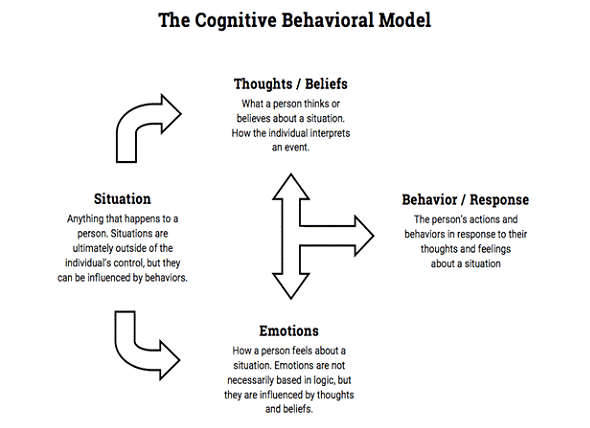Cognitive Behaviour Therapy
By Christine Ferch

Cognitive behaviour therapy, also known as C.B.T., is a therapy which addresses maladaptive thoughts, attitudes, or beliefs (cognitions) that propel negative behaviours to handle emotional problems. It is a short-term goal-orientated psychotherapy that uses a hands-on approach to solving our problems.
C.B.T. also addresses our behaviours and the personal meaning we place on things and how our way of thinking develops in childhood. Behaviour component focuses on the cyclical relationship between our thoughts, feelings, and behaviours.
Naturally, our thoughts will wander, and naturally, some of our thoughts are automatic and filled with emotion. Sometimes we are aware of these thoughts, other times, we are not which impacts our ability to present healthy cognitions, feelings, and responses to a specific situation. Identifying these automatic thoughts allows us the chance to reframe them into realistic and helpful thoughts.

CBT Treatment Therapy
If you are an individual who likes structure than Cognitive Behavioural Therapy might be useful as most therapies allow an individual to talk about what ever is coming to mind freely. C.B.T. begins with developing rapport by identifying specific problems or concerns and setting goals to solve those problems or concerns. The therapy is usually short, lasting 5-10 months at an hour session once a week.
At the beginning of each session, the client and therapist will mutually plan for the content or main topics to be discussed. Additionally, the therapist will leave time to address anything significant which came up for the client since their last visit as C.B.T. therapy does require the client to partake in some forms of homework. However, the homework can be adapted or modified to suit the client’s learning needs.
The structure is necessary because therapy is completed in a short time frame which can be ideal for many individuals. As the sessions are structured, there is a smaller opportunity to miss crucial information. The main goal of C.B.T. is providing the client with the opportunity to release thoughts and feelings which have been internalizing, shift negative thinking patterns to positive and monitor their behaviour under emotional stress. As well, build their competency in coping skills, so when the client is faced with something troubling, they have the confidence they can handle the problem and solve it.
What does CBT help?
Cognitive Behavioural Therapy or C.B.T. is a therapy which is used for many different mental health concerns. Those who have difficulty with sleep, depression, anxiety, stress, anger management, panic attacks, child and adolescent problems, chronic pain, addiction, eating problems, O.C.D.

C.B.T. Strategies
C.B.T. aims to change the following thinking patterns:
- Learning to recognize one’s distortions in thinking who are creating the problems they are enduring. Then reframe those thoughts in a realistic manner
- Enhance one’s understanding of the behaviour and motivation of others
- Learning to use problem-solving skills to cope with stressful situations
- Developing a better sense of self-worth, love, esteem and confidence
Strategies C.B.T. uses to address maladaptive behaviours:
- Facing fears and not avoiding them
- Using role-play to prepare for problematic situations which may arise in the future
- Learning mindfulness and emotional awareness to relax one’s body and reduce tension
C.B.T. is an empirically tested theory which means it has been tested under various conditions and variables to indicate if it is an effective treatment strategy. For the concerns mentioned above, C.B.T. is proven to be very helpful and increasing one’s quality of life.
If you have any questions about C.B.T. therapy, please contact us at admin@ovcs.ca. We have other great articles you might enjoy take a look here.
Connect with one of our counsellors by completing the form below.




